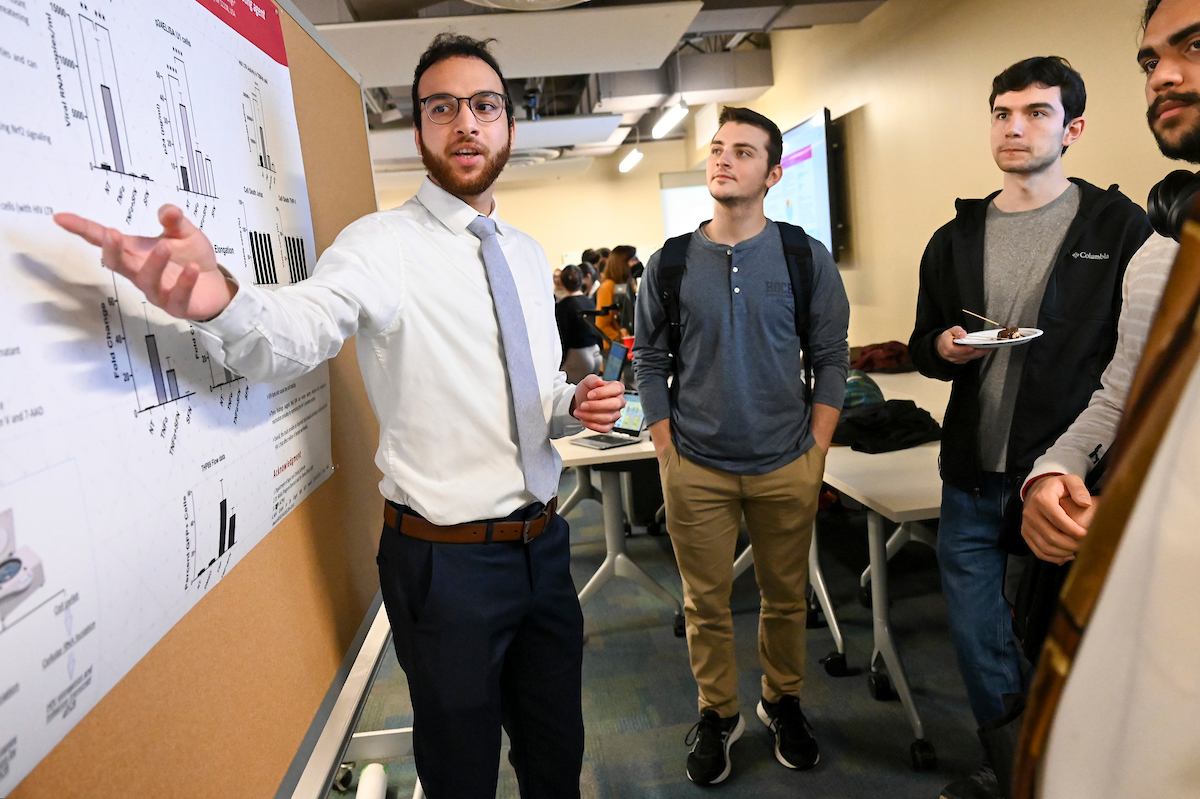ACPHS Students and Faculty Showcase Their Research at the 2022 Annual Research Symposium
More than 40 students and faculty presented research projects at the college’s annual two-day research symposium on April 7-8, 2022.
Students and faculty from all academic programs presented during this highly interactive event that showcases the extraordinary research being done by faculty and students.
“Students have a lot of pride presenting their work and appreciate the input they get from professors. This integrated event illustrates the tremendous interdisciplinary collaboration we have here at ACPHS,” said Associate Professor Dr. Timothy LaRocca, one of the faculty organizers of the event.
The research topics were as diverse as the academic programs offered at ACPHS in four departments: Basic and Clinical Sciences, Pharmacy Practice, Pharmaceutical Sciences, and Population Health Sciences.
Students had the opportunity to work alongside experienced faculty to delve into several areas of interest including breast cancer, dementia, health equity, hyperglycemia, monoclonal antibodies, ovarian cancer, and the socioeconomic factors that impact anxiety and depression diagnoses.
Rima Kaddouh and Saima Hannan, two fourth-year students in the Department of Population Health Sciences who researched the impact of community-pharmacy collaborations on advancing health equity, agreed that their research confirmed using a grassroots approach was an effective way to reach traditionally medically underserved communities.
Students and faculty were pleased to have the first day of the symposium held in person since the entire program was virtual the last two years due to the pandemic.
“The quality of the students’ work was exceptional, and they demonstrated incredible poise and professionalism during their presentations,” said Director of Research and Professor Martha Hass, one of the faculty organizers of the symposium.
In addition to the in-person student and faculty poster presentations on the first day of the Symposium, there were virtual presentations by ACPHS students and faculty and a keynote speaker on day two.
Dr. Pradeepa Jayachandran, Assistant Professor in the Department of Basic and Clinical Sciences presented her work titled, “Antibiotic-induced SOS response in mediating antimicrobial resistance in Staphylococcus aureus.” Dr. Jayachandran also presented progress on the “SEA-PHAGES” project, a two-semester program designed to teach microbiology students a variety of microbiology and molecular biology techniques. Students isolate, characterize, and name their newly-discovered phage virus, and using bioinformatics tools, the students look for patterns in the sequence to identify genes that make up the phage genome.
Keynote speaker, Dr. Urania Rappo, MS, PharmD and MD, a Senior Director of Clinical Development at BiomX, discussed the mechanism of action of bacteriophages (phage) on target bacteria, and potential clinical applications of phage therapy in her presentation entitled “Phage: A new frontier in antimicrobial drug development.”
An expert in the field, Dr Rappo, joined BiomX in 2020 after working on the clinical development of dalbavancin and other anti-infectives at Durata Therapeutics, Actavis and Allergan. She earned her undergraduate degree at Barnard College, her PharmD at Arnold & Marie Schwartz College of Pharmacy and Health Sciences of Long Island University, her MD at Drexel University College of Medicine, and her MS in Clinical Epidemiology and Health Services Research at Weill Cornell Graduate School of Medical Sciences. She completed her residency in internal medicine at NYU School of Medicine, her fellowship in infectious diseases at Memorial Sloan-Kettering Cancer Center, and her National Research Service Award fellowship / T32 training program at Weill Cornell Medical College.
The annual research symposium recognizes and celebrates the extraordinary research being done by faculty and students at the college. The wide range of topics illustrates the diverse expertise of the ACPHS community.


